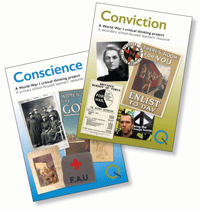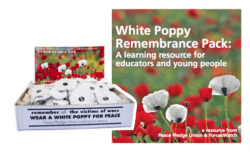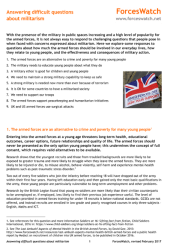Conscience and Conviction – WWI school resources

Quaker Peace and Social Witness has produced two new resources for peace education: Conscience (primary school-focused) and Conviction (secondary school-focused).
Conviction can supplement existing lesson materials in subjects such as History, Religious Education or Citizenship, and be used to support the delivery of Personal Social Health Education (PSHE) or Spiritual Moral Social Cultural (SMSC) education.
Through engaging with speaking and listening activities in pairs and groups, children can discuss and reflect on historical source materials including documents, letters, posters and images.
Printed copies are £5 each. Contact the Quaker Centre at quakercentre@quaker.org.uk or telephone: 020 7663 1030. For more information see here
Quaker Peace and Social Witness has produced two new resources for peace education: Conscience (primary school-focused) and Conviction (secondary school-focused).
“Conviction is a fantastically thorough resource that can be used in many settings across the school. It illuminates how times of war call for personal sacrifi ces which are not just within combat settings. Through understanding the way so many citizens of principle were caused to examine their conscience, and the cost of living in accordance with those beliefs students will recognise the level of integrity in so many of their forebears and uncover the depths of dilemma that this war brought to the country.”
Andy Thornton, Chief Executive Officer, Citizenship Foundation
Conviction can supplement existing lesson materials in subjects such as History, Religious Education or Citizenship, and be used to support the delivery of Personal Social Health Education (PSHE) or Spiritual Moral Social Cultural (SMSC) education.
“Conscience encourages constructive refl ection on World War I while also fostering skills and understanding required by the National Curriculum. The Quaker perspective offers unusual challenges and opportunities for children: to develop their own moral compass; and to build their capacity to work with others towards a better world.”
Michael Madden, HMI schools (retired)
Through engaging with speaking and listening activities in pairs and groups, children can discuss and reflect on historical source materials including documents, letters, posters and images.
[These are] “terrific high quality resources which can be used flexibly in primary and secondary classrooms to inspire young people’s critical thinking and discussion on the key issues of conscience and conviction. Every school should have a copy of them.”
Dr Sue Dymoke, Reader in Education, School of Education, University of Leicester
Printed copies are £5 each. For more information see here



